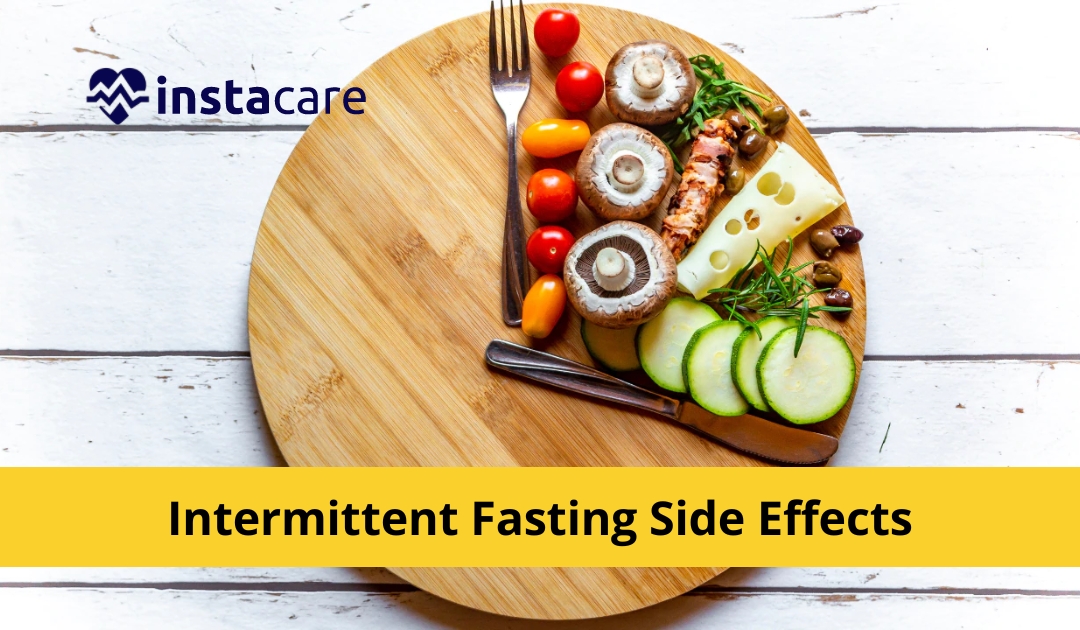Intermittent fasting has become one of the most popular health trends in recent years, and for good reason. Proponents say that it helps improve overall health, weight loss goals, mental clarity and so much more. However, like with any change to your lifestyle or diet there are potential risks and side effects associated with intermittent fasting.
Before making a decision about starting intermittent fasting, it's important to be aware of what those side effects could be - both short term as well as long-term changes that you should take note of if they start occurring. In this article we will discuss 11 possible intermittent fasting side effects you must know about before deciding whether or not this type of approach is right for you!
What is intermittent fasting?
Intermittent fasting is an increasingly popular way of eating that involves periodic cycles of going without food for a certain time frame. This approach to caloric restriction, which is based on when you eat rather than what you eat, has many potential health benefits.
These may include improved weight management and increased longevity, to name just a couple. Intermittent fasting also appears to have positive psychological effects; it can reduce stress and lead to better sleep patterns. While it's a great strategy for some people, intermittent fasting isn't necessarily for everyone; you should talk with your doctor before beginning any new diet or health regimen.
Approaches to intermittent fasting
Intermittent fasting is a popular dieting technique that has been gaining momentum in recent years. It involves changing the timing and number of meals eaten throughout the day, or forgoing a meal altogether. There are several approaches to intermittent fasting, such as skipping breakfast (the most well-known of the techniques), intermittent calorie restriction, time-restricted feeding, and other structured methods.
Each approach has its own benefits as well as possible risks depending on one’s unique health profile. Thus, when considering incorporating intermittent fasting into your routine, it is important to do so cautiously with guidance from a healthcare professional if necessary. With proper execution, however, you may find that these lifestyle changes can help optimize both your physical and mental wellbeing.
Side effects of intermittent fasting
1- Hunger
Hunger is one side effect of intermittent fasting, a dietary practice which involves intentionally going without food for varying lengths of time. There are many potential benefits to this practice, such as better immune system functioning and weight loss. However, hunger can be uncomfortable and overpowering if not properly managed. Fortunately, there are strategies that fasting participants can implement to control their hunger during times when they choose to fast.
This can include eating foods that have a high satiety level and drinking lots of fluids throughout the day. Additionally, it's important to distract yourself with activities such as reading or exercising while fasting to take your mind off any potential feelings of hunger arising. With the right approach, intermittent fasting needn't be overwhelmingly uncomfortable; rather, it can be an effective way to achieve long-lasting good health.
2- Headaches and lightheadedness
Intermittent fasting can be an effective way to lose weight and eat healthier in general, however side effects are also common. For example, many people experience headaches and lightheadedness as side effects. This is due to the changes in blood sugar levels that come with intermittent fasting - when blood sugar levels become dramatically lower, it can cause these side effects. Headaches and lightheadedness may not seem like anything much, however if it becomes persistent then it might be a good idea to try adjusting your approach to intermittent fasting or stopping altogether if necessary.
3- Digestive issues
Intermittent fasting is becoming a popular method of eating, but side effects such as digestive issues can occur. This type of eating cycle involves extended periods of time without food, with the average fast typically ranging anywhere from 12 to 17 hours. During this period of restricted calorie intake, side effects like heartburn, acid reflux, or bloating may be experienced due to an imbalance in digestive functions as the body does not have enough resources to work properly in digestion and nutrition absorption.
View More: 13 Amazing Jamun Benefits
If you are considering intermittent fasting for health and weight loss goals, it is important to speak with a medical professional about side effects such as these that may occur. With the information provided by your doctor and healthy lifestyle choices, effective results may be achieved with minimal side effects.
4- Cravings
We all experience cravings from time to time, but suppressing them can be beneficial for our overall health. Intermittent fasting is a type of diet that involves periods of eating and restricted caloric intake, which may lead to side effects such as intense cravings for certain foods. While side effects may be a part of intermittent fasting, science has shown that it brings about several positive tangible outcomes for the body.
The results remind us that cravings are merely a side effect and shouldn’t define our physical or emotional wellbeing. Nevertheless, it is important to understand our body’s signals while monitoring any potential side effects in order to make an informed decision about intermittent fasting and its level of difficulty.
5- Irritability and other mood changes
Irritability and other mood changes are among the side effects of intermittent fasting. But it’s important to keep in mind that they’re usually caused by lower blood sugar levels due to not eating regularly, so they can be easily prevented by ensuring you stay adequately nourished during your fasts.
While intermittent fasting isn’t necessarily a dangerous practice, it is important that those who choose to do so understand that this increase in irritability may be possible and take steps to mitigate its symptoms. Making sure to drink plenty of fluids is often enough to reduce or prevent any occurrences.
6- Fatigue
Fatigue is a side effect of intermittent fasting that can often be overlooked. Intermittent fasting let's you cycle between periods of eating and periods of abstaining from food for certain intervals, and is said to promote health benefits such as improvement in insulin sensitivity and weight loss. While this form of fasting can be beneficial, it can also cause the body to experience side effects such as fatigue. This happens because, when you fast, the body switches from burning glucose for energy to breaking down stored fat for fuel.
During this transition period, your body needs more time or rest to adjust which could in turn lead to feeling fatigued throughout the day. Furthermore, if done incorrectly, intermittent fasting may also lead to nutrient deficiencies which could further add to feelings of exhaustion over time. Therefore, it is important that proper precautions are taken before deciding wether or not intermittent fasting is right for you!
7- Bad breath
Bad breath can be caused by side effects of intermittent fasting, even if you maintain good oral hygiene. Common side effects include dry mouth or a decrease in saliva production due to dehydration, which can cause an increase in the number of bacteria living in the mouth that produce odors.
Additionally, when food is restricted for long periods of time, it can cause an imbalance between beneficial and harmful bacteria within the digestive system, resulting in further odor-causing bad breath. If you are engaging in intermittent fasting and notice your breath becoming overly smelly or unpleasant-tasting, it is important to speak with a medical professional about possible solutions.
8- Sleep disturbances
Sleep disturbances are side effects of intermittent fasting that can be quite severe. Changes to circadian rhythms and imbalances in hormones such as leptin, ghrelin and cortisol can all contribute to disrupted sleep patterns, making it hard to get the restorative shut-eye our bodies need.
If you’re fasting, keep a close eye on your sleeping patterns; if you notice difficulty with falling or staying asleep, try taking small steps like avoiding caffeine after 2:00 pm or reading an engaging book before bed to better regulate your sleeping habits.
9- Dehydration
Intermittent fasting, while a popular dieting trend and possible beneficial method of losing weight, can also lead to side effects such as dehydration.fasting disrupts the body's natural cycle of hydration, leaving you feeling fatigued or lightheaded. Dehydration can also cause headaches, blurry vision, and in serious cases, coma or death.
It's important to regularly drink water during any period of intermittent fasting - doing so will ensure that side effects such as dehydration are minimized and allow you to get the most out of your chosen diet style.
10- Malnutrition
Malnutrition has become a major problem across the world, and for those that are trying to lose weight, it can be difficult to do so in a healthy way. Intermittent fasting is often suggested as one of the approaches employed by people looking to lose their excess weight, but what side effects can come with such an option? Studies have shown that side effects can include dizziness, headaches, weakness, fatigue and dehydration.
View More: 10 Amazing Stunning Capsicum Benefits
Therefore it is important to take into consideration the long term side effects of intermittent fasting before adopting this approach to weight loss. Additionally, diets rich in proteins and complex carbohydrates should be included in any type of malnutrition treatment plan in order for individuals to obtain the necessary vitamins and minerals required for optimal health.
11- Low energy
Intermittent fasting is all the rage these days, but side effects such as low energy can often be experienced. This decrease in overall energy levels can be caused by eating less frequently, reduced calorie intake, and a lack of important nutrients. Low energy will also lead to tiredness and fatigue throughout the day, reducing mental sharpness and physical strength.
It’s therefore important to pay special attention to how you’re feeling while engaging in intermittent fasting, making sure to adjust your schedule or diet accordingly if low energy persists. Eating a balanced diet full of nutritious foods is the key to avoiding side-effects like low energy due to intermittent fasting.
Who should avoid intermittent fasting?
Intermittent fasting has become a popular weight-loss option, but it is not suitable for everyone. Anyone with a history of an eating disorder should avoid intermittent fasting as this type of schedule could trigger unhealthy behaviors around food.
Additionally, anyone who experiences side effects like weakness, low energy, irritability or headaches should discontinue intermittent fasting and consult a medical professional. Before beginning any kind of new eating regimen, it is important to consider the side effects and your personal wellness needs in order to make a healthy decision for yourself.
Benefits of intermittent fasting
Intermittent fasting is gaining traction as a popular dietary pattern due to its potential health benefits. It involves alternating between periods of eating with periods of fasting for extended hours. While research on intermittent fasting is still in its early stages, there are some side effects to consider such as fatigue and headaches.
However, research indicates that these side effects may be temporary, and people can eventually adjust their body clock to accommodate intermittent fasting. Additionally, intermittent fasting has been shown to lower blood pressure, reduce inflammation levels and improve metabolic markers - so it could offer real long-term health benefits without the side effects experienced while adjusting.
Conclusion
Intermittent fasting is a tool that can be used to manage weight and other health conditions, but it’s not for everyone. Some people may experience side effects when they start intermittent fasting, such as headaches, fatigue, cravings, or low energy. If you start intermittent fasting and find that you are experiencing any of these side effects, talk to your doctor or nutritionist to see if it’s the right tool for you. And remember – even if intermittent fasting isn’t right for you, there are many other healthy eating plans out there that can help you reach your goals.
Please book an appointment with the best Nutritionist in Lahore, Karachi, Islamabad, and all major cities of Pakistan through InstaCare, or call our helpline at 02137136090 to find a verified doctor for your disease.
Source: https://instacare.pk/blog/intermittent-fasting-side-effects











